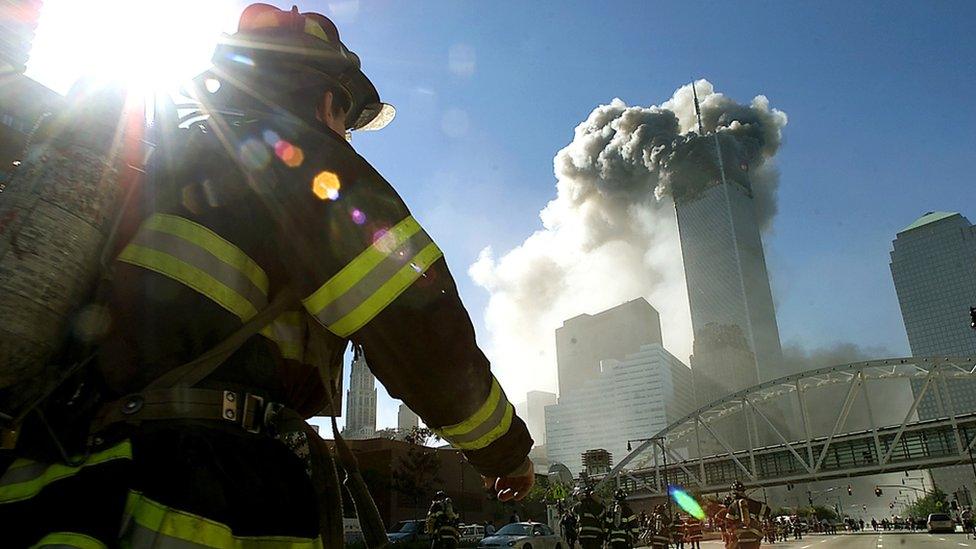9/11 anniversary: Barbara Stephenson 'sobbed' over Belfast's tributes
- Published
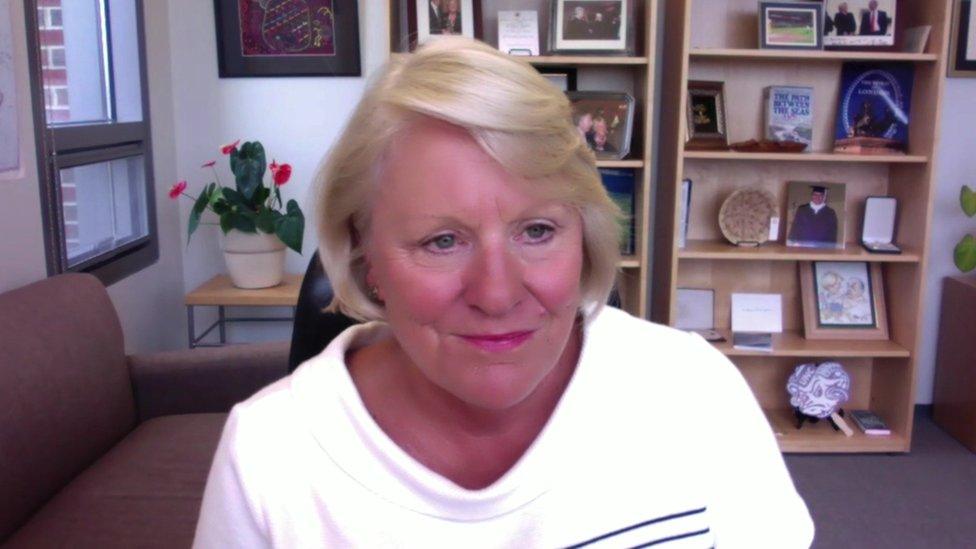
Barbara Stephenson, former US consul general to Northern Ireland, spoke to BBC Radio Ulster from the US
A senior US diplomat has recalled breaking down in tears when she saw the number of tributes people in Belfast had left for victims of 9/11 in 2001.
Barbara Stephenson had been appointed US consul general in Northern Ireland just a few weeks before the US attacks.
She said it was difficult to get back into the US consulate building in Belfast as the doorway was filled with candles, flowers and sympathy messages.
"It was a very powerful moment," she said.
Ahead of the 20th anniversary of 9/11 this weekend, Ms Stephenson said she had been reflecting on "the response that we got from the people of Northern Ireland in our time of need".
She said one of her strongest memories of that time was how "the people of Belfast felt for us and stood by us and supported and gave us comfort".
Almost 3,000 people were killed on 11 September 2001 when four US passenger planes were hijacked and flown towards buildings.
Two of the planes hit the Twin Towers of the World Trade Center in New York, causing both towers to collapse.
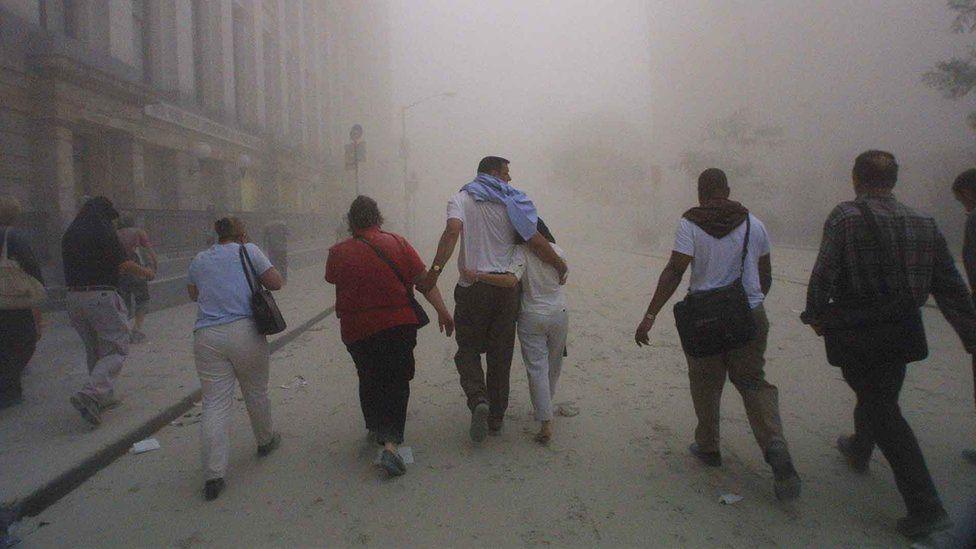
New Yorkers fleeing the debris from the attack
A third plane hit the Pentagon, the US military's headquarters outside Washington DC, but passengers on the fourth plane fought the hijackers and that aircraft crashed in a field in Pennsylvania.
Ms Stephenson has shared her memories of that day with the BBC's Good Morning Ulster programme.
"I was new to Belfast, my family and I had just moved in two or three weeks earlier," she recalled.
On 11 September, she was preparing for her first meeting with the then US special envoy for Northern Ireland, Richard Haass, who was due to arrive in Belfast later that evening.
She was driving back from afternoon talks with Northern Ireland's secretary of state when she heard a report on her car radio that there had been an "accident" at New York's World Trade Center.
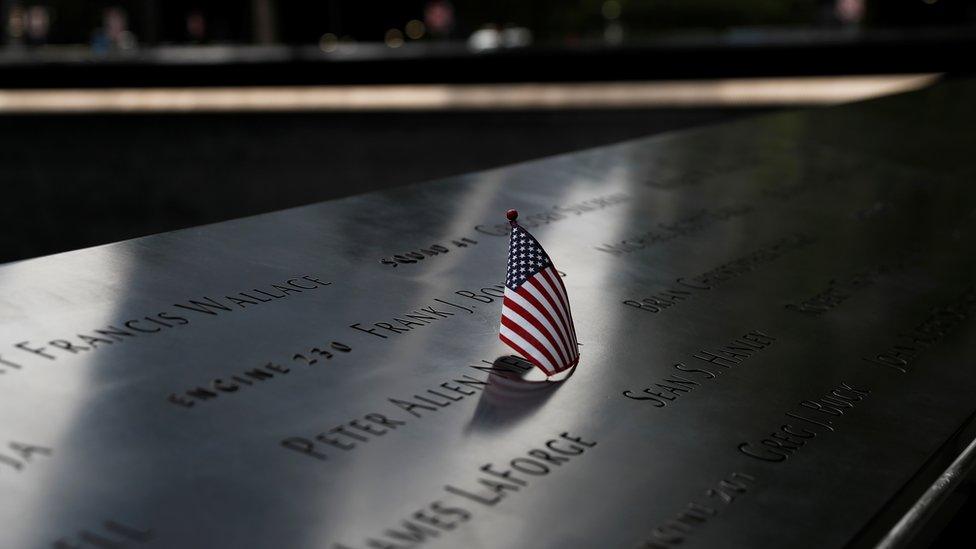
A flag rests on the national 9/11 memorial in New York
After she returned to the consulate, news of a second plane hitting the towers began to come through and she realised that the US was under attack.
'White House still standing'
A short time later, Mr Haass arrived from Dublin by train and Ms Stephenson went to meet him at a Belfast station.
"He'd been out of touch for a couple of hours, and as soon as he got there he asked me for a briefing," she said.
"And I have this distinct memory of reassuring him that the White House was still standing. The Pentagon had been hit, people were fleeing on foot, but the White House was still standing.
"When I think about that, it's a reminder of how while that day was unfolding, it was just hard to know what the bounds of the damage were."
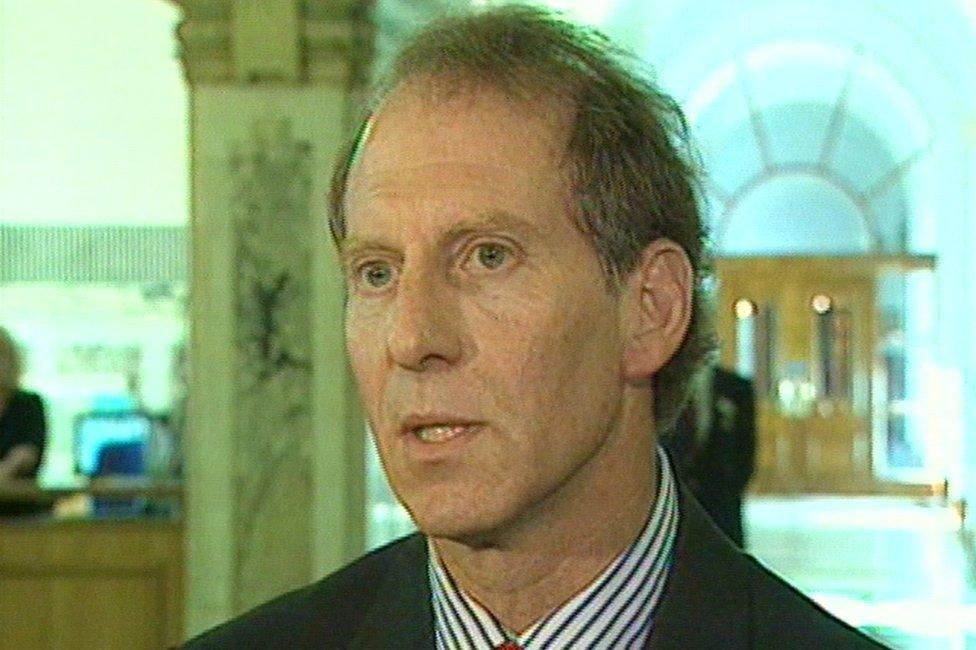
Richard Haass spoke to the media about 9/11 shortly after he arrived in Belfast
The US diplomatic team stuck to their schedules however, and went ahead with planned meetings with Northern Ireland's political parties, which Ms Stephenson said seemed remarkable to her now.
"Richard Haass had to break off for a minute to go do a phone call back to Washington, because he was also director for policy planning at [the ] State [Department]," she added.
While he was on the phone, Ms Stephenson was standing beside Sinn Féin leaders Gerry Adams and Martin McGuinness, watching TV news coverage from New York.
"That is when I first saw the footage of the towers collapsing and the enormity of what had happened just settled in on me," she said.
"I do remember saying to Martin McGuinness: 'Fifty thousand people worked in those buildings, the loss of life will be enormous'."
'We were hurting'
Shortly after the attacks, the US consul general recalled a "beautiful tribute" to the victims from another high profile Northern Ireland politician - Monica McWilliams from the Women's Coalition.
Ms McWilliams spoke about how the US had supported Northern Ireland, "not by sending soldiers... but by sending diplomats to help make peace," Ms Stephenson said.
"When you're hurting like we were hurting and you're still trying to carry on, there was something about Monica's words that were just like a balm for the soul."
A book of condolence was opened for the US victims at Belfast City Hall, and Ms Stephenson went to the building to sign it alongside Mr Haass and the then Northern Ireland secretary of state, John Reid.
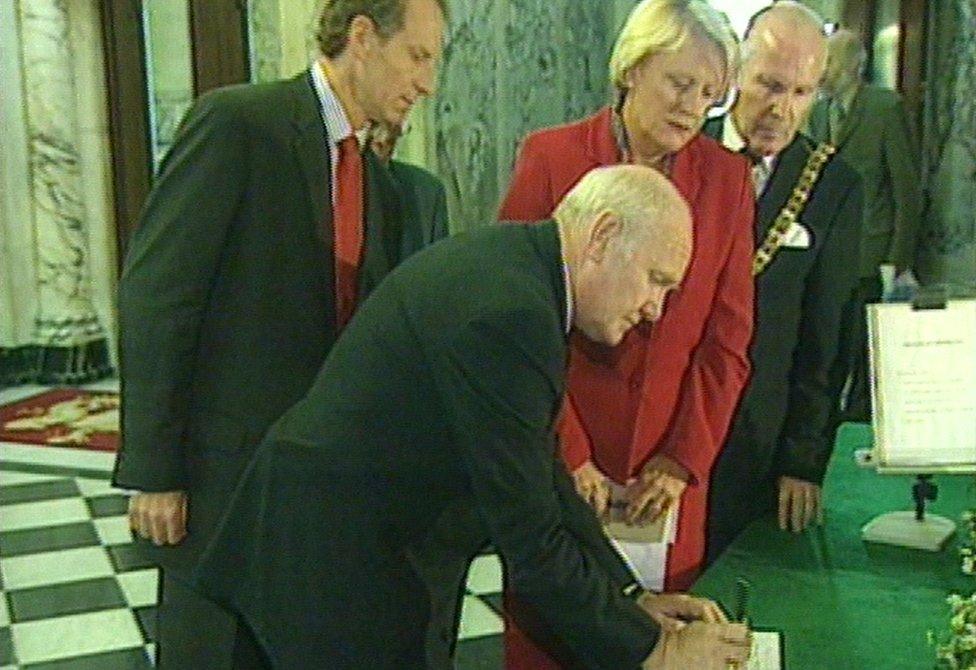
John Reid signing a book of condolence in Belfast City Hall in 2001, with Barbara Stephenson, Richard Haass and Belfast's lord mayor

All three walked back to the US Consulate General, which was then on Queen Street, when they were confronted with an outpouring of public sympathy.
"I had held it all together through all of this, and I was fine," she recalled.
However, as they approached the building, Ms Stephenson said she broke into tears which she described as "not just a trickle, but a sob".
"I saw that we couldn't get into the consulate because the doorway was just filled with candles and handwritten notes 'to our American cousins' and bouquets of flowers."
Mr Reid sat with her for the rest of the day as they read the sympathy messages.

Barbara Stephenson. with her husband, wiping tears from her eyes during a Belfast church service shortly after 9/11
Ms Stephenson said her own diplomatic mission to Northern Ireland was to help the peace process "take deep roots".
Her officials had prepared some remarks for her in the immediate aftermath of 9/11, but she felt the speeches concentrated too much on the hijackers and finding those responsible for the attack.
Instead, she turned to the pile of sympathy cards and messages, and she used their contents to compose her subsequent public remarks about 9/11.
Ms Stephenson expressed hope that her words and actions in response to the US attacks may have helped to make some progress in the Northern Ireland peace process.
"If it helped, I am so grateful because it was my purpose for being there," she said.
"And I like to think that that's so, because it sure does make it easier to think back on all of that if we believe that some good has come out of it.
"I would note that the peace has held, and it makes me so happy to say that."
